All living beings rely on food for strength and nourishment. Food is an essential aspect of life. For individuals to lead a healthy and happy life, our scriptures have recommended certain dietary norms like not eating unless hungry, not eating at times other than the stipulated meal times, not eating leftovers, making seasonal changes in diet, not eating food given by those who have earned it by unrighteous means, offering prayers before eating etc. Everyone should consume sattvik (Sattva-predominant) Bharatiya food items prepared at home. They are fresh, easy to digest and result in good physical, mental and spiritual health. Let us understand more through this article.
1. Ahar (Diet)
A. Definition
-
Food that partially nourishes the Manomaya-kosha (Mental sheath) and the pranamaya-kosha (Vital energy sheath) is called ‘ahar’.
-
That hunger-satisfying food which is created, sustained and dissolved after observing proper conduct, for observing good conduct and is created as per prescribed conduct is termed ‘ahar’.
-
That food which eliminates lack of sanctity, impurity and un-righteousness (which means, they are destroyed when they originate in the body) and which is enriched with attraction and good health is termed ‘ahar’.
B. Diet of the jivatm
A jivatma is nourished by a diet of bhav (Spiritual emotion) unto a Deity in the true sense of the term; hence, ‘devotion’ is the diet (Food) of a jivatma.
C. When an individual is content on being nourished by
Chaitanya (Divine consciousness), it does not feel any need for worldly contentment
As desires reduce, the need for nourishment reduces, meaning, the person is now content with Chaitanya in the true sense. Therefore, it no longer needs worldly contentment.
2. Importance of diet
A. Why does body need diet (food), when God Himself
has created this body; why does it not function on its own energy?
In Satyayug, man lived for thousands of years without food and water. During that period, his body was active on its own chetana. The activities of Maya (The Great Illusion) kept increasing with the passing of the Eras, meaning activities pertaining to Raja–Tama increased. The chitta (Subconscious mind) becomes inactive due to spiritual practice. Due to lack of spiritual practice, the chitta started becoming active again. This led to increase in the activities of worldly desires in the chitta and the awareness about contentment reduced; this in turn created desire for experiencing contentment. Hence, the body began to feel the need for diet.
B. Why is food is termed as ‘Purnabrahma’ (Absolute Brahma) ?
Brahma is ‘Me’. The ichha-laharis (Waves of will) in a person are the source of desire. Desire is the source of contentment. This process is a part of the body, meaning, part of the Divine form which also includes Panchapran (Five vital energies) etc. The nourishment of this part means contentment; this contentment creates the need for food. Food provides nourishment, which itself is a function of Deity Brahma; hence, it is termed as ‘Purnabrahma’. That which is not incomplete is absolute! That which absolutely nourishes the body is food; hence, the word ‘Purnabrahma’ is used for food.
C. Why is the act of consuming food, with the
purity of mind, called as a ‘yadnya-karma’ in the great Hindu culture ?
Contentment is essential for a person. Food imparts external nourishment to the body. When we offer food to Deity Agni (Deity of fire), we gratefully free ourselves from the debt of Deity Agni; then Agni is satisfied, meaning, He becomes peaceful and benevolent. In this way, the person becomes content by eating food with a pure mind. This satisfaction pacifies Deity Brahma in the form of body. Hence, in the great Hindu culture this holy act has been termed as ‘yadnya-karma’ by the Sages.
Three steps of eating food in ‘yadnya-karma’ are :
- Smaran : Bhagawat-chintan (Remembering God)
- Bharan : Filling
- Havan : This activity generates energy necessary for functioning
All the above activities take place during a yadnya; hence, the activity of eating food is called ‘yadnya-karma’.
D. Our tongue experiences six kinds of
flavours helping the body to receive best nourishment
God is the creator of nature. He created six flavours. The body is best nourished when it experiences these six flavours – sour, pungent, salty, astringent, sweet and bitter. The tongue has been bestowed with the function of tasting.
E. The objective in eating food as per trigunas
-
Sattva : Eating food because it is a duty towards the body.
-
Raja : Attaining happiness by consuming food.
-
Tama : Believing that one lives only to eat or eating food to keep the envious or demoniacal attitude awakened.
Since the Saints are beyond the trigunas they eat food only as parechha (Other’s wish) or Ishwarechha (God’s wish).
So long as the body exists, the trigunas are not destroyed completely; however, when compared with an average individual, the proportion of trigunas in Saints is negligible. Hence, it is said here that the Saints are beyond the trigunas.
3. Dietary norms
A. The reasons for formulation of dietary norms by Authors of scriptures and their relation with vrat (Vowed religious observance), niyam (Rules, daily rituals) and tapa (Penance)
The body skin renews itself completely every three years, the flesh every seven years, and bones every twelve years; this means that the body completely renews itself in 12 years. Authors of scriptures formulated certain dietary norms on realizing that ‘A particular attribute can be easily developed if a specific food complementary to that attribute is eaten regularly for 12 years’. If these norms are followed for three years, it becomes a vrat; if followed for seven years, it is termed as a niyam and if adhered to for 12 years it is called a tapa. They also made a rule that after the upanayan (Thread ceremony), every individual must follow some vrat in the Gurukul.
B. Importance of strictly following the dietary norms as prescribed by the Dharmashastra
-
A truly balanced diet in the modern scientific Era : The food-faddists of this scientific Era prescribe a perfectly balanced diet. However, we prescribe two chapatis (Bharatiya bread), one serving of rice, pulses, vegetable, chutney, salad, tomato, a bowl of curd, and either a banana or an orange. You receive 2200 calories through this food. This can keep you completely healthy and enthusiastic throughout the day. This is the world’s best, sattvik, easily digestible, enthusiasm enhancing and a healthy diet.
-
His Holiness Karpatriswami, the founder of ‘Ramrajya Parishad’ used to get up at 3 a.m. and complete His ablutions. After brushing His teeth, He would bathe with cold water from a well. Then, He would perform His daily worship rituals. He would have lunch at 5 p.m. His celibate disciple would wear a sovale after a bath and cook for Him. Chapatis made from flour that had been ground with the hand, rice, green gram, pulses, lemon, ginger, cow’s milk and ghee (Clarified butter) formed His meal. Salt, chilies and pungent items and sugar were prohibited. The food would be cooked on a coal stove. He would drink cow’s milk before going to bed. Fruits were included in His diet. Grains and vegetables grown with the help of chemical fertilizers were prohibited. Cooking of food on kerosene or gas stoves was also prohibited.
-
He would not drink even a drop of water before lunch. He was continuously on the move and His vehicle carried all supplies like coal, stove, water from the River Ganga, utensils for ritualistic worship etc. Till His last breath, He did not deviate from His daily rituals and spiritual practice. This routine continued for 60 years without a break. He never fell sick. Therefore, He never had to go to a doctor! He was very strict in following the dietary norms prescribed by the Dharmashastras till His last breath.
-
By following dietary norms, the penance of the internal body is accomplished and a person starts its journey towards nivrutti, meaning Yoganidra.
-
Sages in the ancient times have prescribed norms about when to eat, how to eat, how to produce the various food ingredients by remembering Agni, and also how to worship various Deities at the corresponding levels. Following these norms is like moving from the penance signifying external karma towards God-realization; and this is what is precisely taught by the science of nutrition.
-
Creation of the universe is based on penance. Dietary norms as per the science of nutrition prescribed by the Seers and Sages are based on this penance only.
4. Some rules regarding diet
A. Common rules
-
आहारार्थं कर्म कुर्यात् अनिंद्यम् ।
Meaning : Money should be earned through good deeds only for the purpose of livelihood.
-
Food should always be worshipped. Food which is worshipped regularly provides strength and vitality.
-
Be happy on looking at food and always praise food.
-
Do not eat anything between meals.
-
Eat only when hungry.
-
Eat food in a clean place and that which is offered with love.
-
Diet should be as per our own constitution (vata (Air), pitta (Bile), kapha).
-
So long as man eats because of some desire, his subtle-body is nurtured, but he can fall ill if he eats despite a lack of desire.
-
Eating food, sufficient for body’s needs prevents illness.
-
Eating food in quantity sufficient for body’s needs is a medium.
-
उष्णं स्निग्धं मात्रावत् जीर्णे वीर्याविरुद्धम् इष्टे देशे इष्टसर्वोपकरणं नातिद्रुतं नातिविलम्बितम् अजल्पन् अहसन् तन्मना भुञ्जीत आत्मानम् अभिसमीक्ष्य सम्यक् । – Charaksanhita, Vimansthan, Adhyaya 1, Sutra 24
Meaning : Meals should always be hot, with sufficient amount of oil, and optimum in quantity. A meal should not have uncomplimentary mixed items or combinations (for example, milk and fruits). We should sit at a good place for meals. The utensils for the meal (for example, a plate etc.) should be clean. While dining, an individual should take into account his constitution and eat food with concentration. Food should not be eaten either rapidly or very slowly. While having meals, it is preferable to avoid unnecessary talk and laughter.
-
नोच्छिष्टं कस्यचिद्दद्यात् नाद्यादेतत्तथान्तरा । न चैवात्यशनं कुर्यात् न चोच्छिष्टं क्वचिद् व्रजेत् ।। – Manusmruti, Adhyaya 2, Shloka 56
Meaning : The leftovers should not be offered to others. We should eat meals only at designated times in the morning and evening, and avoid eating food at odd times. We must not overeat. We should avoid moving around with unwashed hands and mouth after meals.
-
We should not eat in the bathroom, since the negative energies present there may enter our body through the medium of food.
-
The diet for an individual depends on the kind of spiritual practice he performs
B. Benefit of eating fresh food
If we develop a habit of eating fresh food, we will have good health as the nutrition and supplementary status is more in them as compared to food prepared earlier and preserved such as sweets, various kinds of fried products etc. The interference of negative energies in fresh food is less since the food is eaten within a short time of its preparation and is exposed to external atmosphere for a very short time. The waves emitted by them are good for health and contain minimum infection of germs. Therefore, fresh food is able to provide strength to the cells in the body. On consumption of fresh food, the Raja-predominant and health-bestowing waves spread in the body, the energy of vitality gains strength and the actions gain momentum. The resistance power also increases.
If food is consumed till it is in a germfree state, one can benefit immensely. Consuming stale food of a few days is harmful for the health from the spiritual perspective too. Negative energies in the environment and the unsatisfied subtle-bodies with unfulfilled desires are attracted to the waves of subtle foul smell emitted by the food. Hence, such food affects the body and mind adversely. Since this food is easily infected with germs, the subtle health-bestowing vitamins in the food affect the health adversely.
5. Rules of diet as per the season
Environment changes as per the season. To cope with these changes, an individual has to incorporate dietary changes too.
There are only two main seasons on the earth – summer and winter. Monsoon, winter and summer are 3 main seasons in Bharat. Each of these is sub-divided into two seasons. Thus, every season lasts two months. Six seasons comprise one year
A. Appropriate diet for the spring season
In this season, it is beneficial to avoid a diet which consists of heavy, oily-greasy, sweet and sour items. Items like parched corn, roasted yellow gram, green gram, barley, fenugreek, bitter gourd, radish, drumstick, yam, raw turmeric, pepper and dried ginger and food items that are easy to digest; dry, bitter, astringent, and pungent should be eaten.
Importance of adhering to salt-free diet for good health : During the month of Chaitra, it is really healthy to adhere to the rule of not consuming salt for 15 days. It is because of this that blood gets purified and we are protected from diseases of the heart, liver, kidney and skin. It has been observed that people who stick to such a diet every year possess better health than others do.
Some beneficial acts to be performed during the spring season :
-
Eating 2g. haritki (Yellow or chebulic myrobalam) powder with honey everyday.
-
Eating 15 tender neem (Azadirachta Indica – A tree with bitter fruits and leaves and having medicinal properties) leaves with 2 grains of pepper, chewing them slowly.
-
Drinking 15-20 ml. juice of neem flowers for 7-15 days in the morning before eating anything. This provides protection from malaria and skin diseases.
B. Diet suitable for the summer
The digestive power decreases during summer. Fatty foods such as milk, butter, ghee should be eaten. Food containing cardamoms, coriander, cumin, sweet, sour and juicy fruits such as pomegranate, Indian gooseberry are beneficial. We should avoid eating food which is either too hot or too cold.
C. Diet suitable during monsoon season
This season is a period for raging of vata and accumulation of pitta components. Hence, it is beneficial to consume all types of juices and hot items. Eating too oily or very dry food should be avoided. A liquid diet should be consumed in minimum quantity. Intermittent fasting is beneficial during this season.
D. Diet fit for the autumn season
In this season, the pitta rages and accumulation of vata component takes place. Hence, we should consume a sweet, bitter and astringent juicy diet. Since ghee reduces pitta, it should be consumed more, but fatty and oily food items should be avoided.
E. Diet fit for Hemant (First part of winter) season
This is the first part of winter. The food is digested well during this season. Therefore, it is beneficial to eat oily or greasy substances, but too cold or dry food items should be avoided.
F. Diet fit for Shishir (Later part of winter) season
The food is digested well during this season. The diet should consist of sweet, sour and salty juicy items. Spicy, bitter and astringent juicy items should be avoided. There is no restriction on oil and ghee.
6. Importance of drinking milk in the evening,
water early in the morning, and drinking buttermilk at the end of meal
दिनान्ते च पिबेद्दुग्धं निशान्ते च पिबेत्पयः । भोजनान्ते पिबेत्तक्रं किं वैद्यस्य प्रयोजनम् ।। – A proverb
Meaning : Milk should be consumed before going to bed and water in the morning after brushing the teeth; drink buttermilk after meals. This will keep the doctor away.
A. Drinking milk in the evening (before going to sleep at night)
Many negative energies arrive in the atmosphere in the evening through the medium of Raja-Tama-predominant waves. Since night time is completely dependent on the Raja-Tama functioning of negative energies, consuming milk, which is a source of Chaitanya, can protect a person from the influence of strong Raja-Tama-predominant negative energies. Hence, drinking milk is advised during this period.
B. Drinking water early in the morning (immediately after brushing the teeth)
Drink water early in the morning (immediately after brushing the teeth); because, water bestows merits and destroys demerits. During the night time, the atmosphere becomes Raja-Tama-predominant, and the body and the void of the mouth are filled with these Raja-Tama-predominant waves due to subtle attacks of the negative energies during this period. To nullify the effects of these Raja-Tama-predominant sinful waves congregating in the body during the night, all-encompassing water in the nirgun (Non-materialized) form is used. On drinking water, the body gets purified. Hence, when the individual performs spiritual practice at Brahmamuhurt after he gets purified, the sattvikta (Purity) obtained from spiritual practice is not expended in dispelling the Raja-Tama components in the body.
C. Drinking buttermilk at the end of meals
Buttermilk contains waves of Raja component; thus, it provides momentum to activity denoting movements. The Raja component in the buttermilk provides momentum to the process of digestion and supplies energy being generated through digestion at the same time that is necessary for functioning of the body or congregates it in the corresponding parts as required. Since Raja component provides momentum to the activities, buttermilk has been given a vital place after meals, since it plays an important role in the digestive process and supplies strength to activity in the form of Raja component, thereby maintaining enthusiasm in activities undertaken throughout the day.
Reference : Sanatan Sanstha’s Holy text ‘Dietary norms and deficiencies in modern diet’.

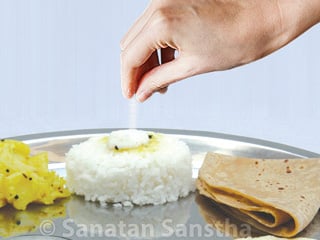 Why use of salt should be restricted ?
Why use of salt should be restricted ?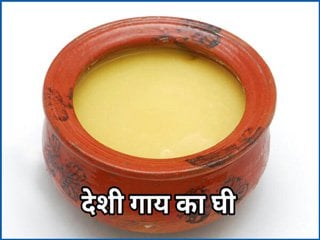 Cow’s milk and the ghee made from Cow's milk
Cow’s milk and the ghee made from Cow's milk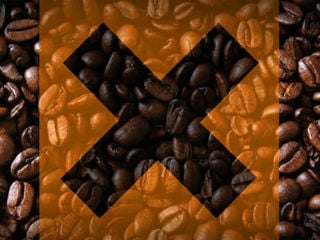 Harmful side effects of Coffee and Tea
Harmful side effects of Coffee and Tea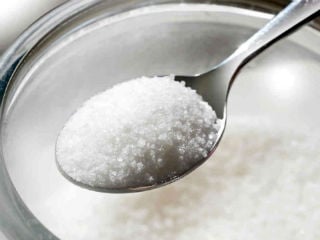 Ill effects of Sugar upon its excessive consumption
Ill effects of Sugar upon its excessive consumption Ill effects of Junk Food, Fast Food and Chocolate
Ill effects of Junk Food, Fast Food and Chocolate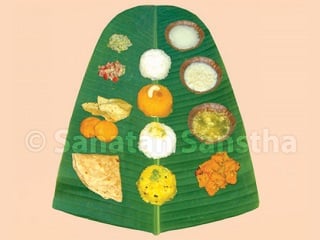 Why the Hindu food preparation (Bharatiya) methods are sattvik?
Why the Hindu food preparation (Bharatiya) methods are sattvik?